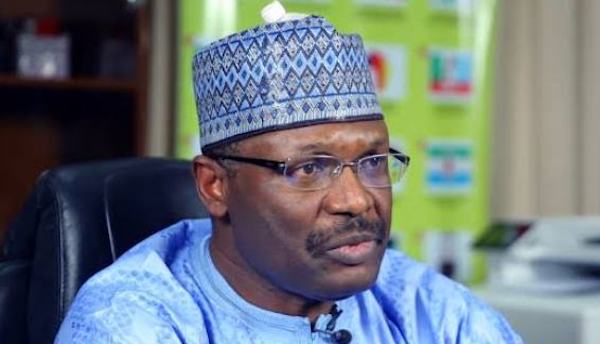Politics
24 Nigerians sue INEC to allow 7m complete their voter registration

Twenty-four Nigerians have filed a lawsuit against the Independent National Electoral Commission (INEC) for “failing to give them and other seven million Nigerians adequate time and opportunity to complete their voter registration after they had carried out their registration online.”
The Plaintiffs who are suing for themselves and on behalf of seven million other Nigerians want to “complete the registration process, so that they can obtain their permanent voter cards (PVCs), and exercise their right to vote.”
INEC recently disclosed that out of 10,487,972 Nigerians who carried out their pre-registration online, only 3,444,378 completed the process at a physical centre. This represents just 32.8 percent of completed online registration.
But in the suit number FHC/ABJ/CS/1662/2022 filed last Friday at the Federal High Court, Abuja, the Plaintiffs are seeking “an order of mandamus to direct and compel INEC to re-activate its continuous voters registration exercise to allow the Plaintiffs to complete their registration and collect their Permanent Voters’ Cards (PVCs).”
The Plaintiffs are also seeking “an order of mandamus to direct and compel INEC to provide adequate facilities and deploy personnel to the registration units of the Plaintiffs to enable them complete their registration and collect their PVCs.”
The Plaintiffs are arguing that, “We have completed the online registration exercise. Denying us the time and opportunity to complete the registration for our PVCs would impair our right to vote, and deny us a voice in the 2023 elections.”
The Plaintiffs are also arguing that, “The inability to complete our registration is entirely due to factors outside of our control. We are eligible Nigerians but unless we are given a reasonable time and opportunity to complete the registration process, and obtain our voter cards, we will not be able to vote in the 2023 general elections.”
The twenty-four Nigerians include: Adeeyo Bayo Wasiu; Kunat Tychius Amos; Tagbo Philips Chidubem; Emeghe Uchanma Grace; Ayoola Opeyemi Ebenezer; Eche Onah Otakpa; Olatoye Clement Damilola; and Ogunejiofor Raphael Emeka.
Others include: Adedotun Adegoke Babatunde; Emmanuel Promise Tochukwu; Emmanuel Ternajev; Joy Oluwadamilola Ige; Lawerence Ignatius; Agbede Kunle; Eze Daniel Ndubisi; and Nkemdilim Agbor Bassey.
Others are: Omoike Iredia Oseine; Joshua Patrick Ogenekaro; Wisdom Emeka; Ukpe Victor Destiny; Abayomi Opeoluwa; Ndubuisi Anthony Ahanihu; Akande Akintunde O; and Adamma Rhodes.
The suit filed on behalf of the Plaintiffs by lawyers to Socio-Economic Rights and Accountability Project (SERAP), Kolawole Oluwadare and Ms Adelanke Aremo, read in part: “Closing the gates on eligible Nigerians cannot preserve trust in the electoral process.”
“According to reports, the inability of Nigerians to complete their voters registration exercise or even transfer their permanent voters’ card, affected wide spectrums of persons, hence this class action by the identified plaintiffs on behalf of other affected Nigerians.
Read also: INEC gives reasons for spending big on conduct of elections
“There were reports of incidence of bribery, unethical conducts of INEC staff, registration process marred by irregularities, insufficient machines, malfunctioning of machines, insufficient staff and unskilled staff, before the defendant ended the Continuous Voters Registration Exercise on the 31st July, 2022.
“The right to vote is not merely the right to cast a ballot but also the right to be given the time and opportunity to complete the registration process, so that the right can be meaningfully and effectively exercised.
“Any proffered justifications of saving time and cost are therefore wholly insufficient. Administrative convenience is simply not a compelling justification in light of the fundamental nature of the right to vote.
“This severe vote deprivation cannot be justified by any perceived considerations of saving time, especially because Section 9(6) of the Electoral Act 2022 provides that ‘the registration of voters, updating and revision of the Register of Voters shall not stop not later than 90 days before any election covered by this Act.’
“Providing fresh opportunity for the Plaintiffs and seven million other Nigerians to complete their registration would promote and preserve the right to vote, and ensure that legal and eligible voters are not inadvertently and unjustifiably turned away from exercising their fundamental right to vote.”
“The Plaintiffs are Nigerians who commenced the voters registration exercises in their respective states via successful online enrolment at the respective dates but could not complete the registration process, and obtain their voters cards.”
“The plaintiffs also include those who are interested in transferring their permanent voters’ cards to another location so that they can vote.”
Join the conversation
Support Ripples Nigeria, hold up solutions journalism
Balanced, fearless journalism driven by data comes at huge financial costs.
As a media platform, we hold leadership accountable and will not trade the right to press freedom and free speech for a piece of cake.
If you like what we do, and are ready to uphold solutions journalism, kindly donate to the Ripples Nigeria cause.
Your support would help to ensure that citizens and institutions continue to have free access to credible and reliable information for societal development.
























